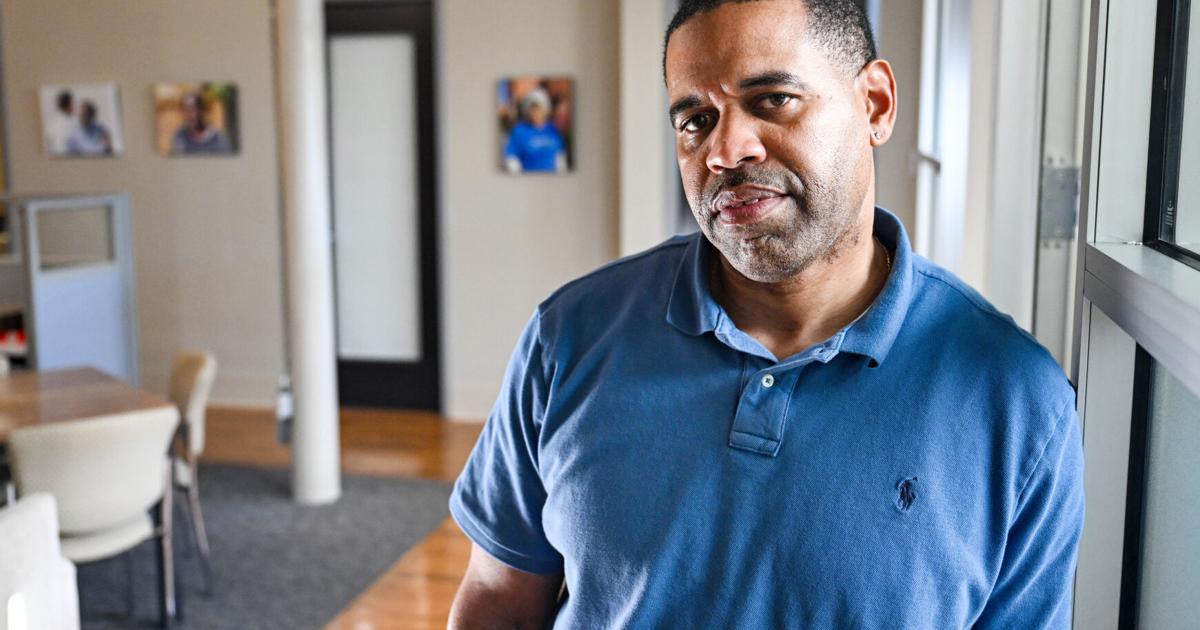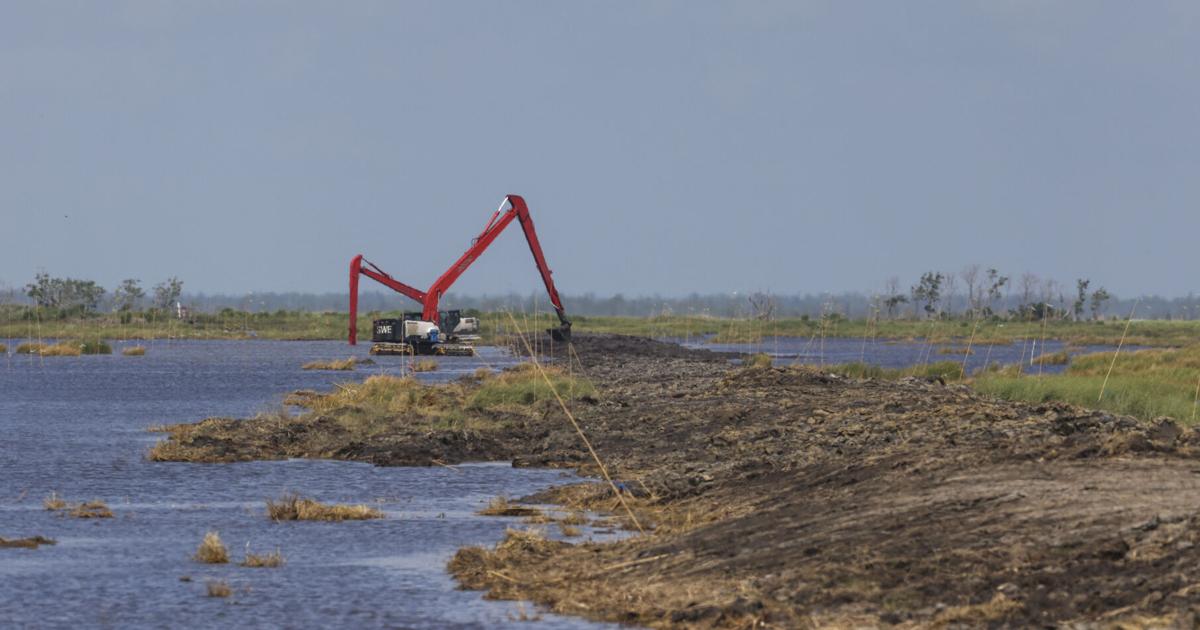Louisiana
This small-town Louisiana radio station still does newscasts in French. It now has fans worldwide.

KVPI stands for “Keeping Ville Platte Informed,” but through 70 years of broadcasting, this radio station has extended its reach far beyond Evangeline Parish.
Listeners from Montana, Arkansas, Germany, New Zealand, and other points around the world tune in regularly to gain unique insight into Cajun culture, in both English and French.
“We’ve done newscasts in French twice a day since day one,” general manager Mark Layne said. “As far as I know we’re the only radio station across the state still doing French news, and I’m proud of that.”
The station is particularly known for “La Tasse de Cafe,” a weekday morning show in which people can call in to speak French, learn about Cajun ways and practices or simply have a chat with one of the show’s hosts — a rotating cast of KVPI’s bilingual DJs.
John and Dottie Miller of Greenwood, Arkansas, credit La Tasse de Cafe with helping them fall in love with Louisiana.
“We’d been listening for years, and one morning nobody was calling in,” John said. “We decided to call in, and the first thing they said was, ‘Do you speak French?’ I said, ‘I don’t even speak English, I’m from New York.’”
That call was in May of this year, and in June the station invited the Millers to come down for a segment about John’s pre-retirement work with Arkansas bomb squads.
John said that people called in from San Diego, Germany, Montana, Florida and Rhode Island that day. “It’s amazing how many people listen to La Tasse,” he says. “We just love it. We’ve made friends with a lot of people down here, especially through KVPI. We became LSU fans and fans of the culture, people, food, music … an array of stuff. They do a really good job keeping French culture alive.”
That ethos was baked into the station from the beginning, Layne said.
“Some of what we were doing in the ’50s we’re still doing today,” he said. “Fairs, news, local sports — we still do all of that. There are no local stations doing obits. We’re still doing that.”
Even with an unapologetically local focus, the station has found interested listeners from all over — many who have some connection to Acadiana, and others who are simply fascinated by a unique region and language.
“We’ve always been committed to supporting our Cajun culture,” Layne said. “Seventy years ago the first general manager was fluent in French, and today we’re still taking the English news copy and translating to Cajun French for the people. There are other stations that play Cajun music, (but) I want people to hear the language.”
Layne is fluent in French, with a story common to many in the region — he grew up in Mamou with parents and grandparents who spoke French, lost much of the language when he went to school but later regained it when one of the station managers he worked under encouraged him to practice.
Other bilingual employees include Jackie Miller and Ray Duplechain, who often share hosting duties on La Tasse de Cafe. Miller is also responsible for reading the morning French newscasts.
“We call it ‘Frenglish,’” said Miller, speaking on the process of translating English-language news into Cajun French. “We mess it up as best we can. People need to realize a lot of these words didn’t exist when we were young — crime, assaults, government stuff.”
A Ville Platte native, Mille said she has been bilingual her entire life. “We’ll put French accents on words, look some up. I just want to keep the French growing.”
Duplechain started his post-retirement career in radio three years ago and loves sharing about his Cajun heritage.
“People want to know how we live, what we eat, the things we did growing up, how we entertained ourselves, how we worked,” said Duplechain, listing frequent topics of conversation on La Tasse de Cafe. “We have people from other countries listening to us to get informed about what’s happening here. They love Louisiana, and some want to come visit — like John and Dottie.”
Like Layne, Duplechain also learned French as an adult. Today, he frequently fields calls from French speakers and people who are looking to learn.
“On La Tasse 50-70% of callers speak to us in French,” Duplechain said. “It’s a beautiful language. You can express yourself in ways that you can’t in English.”
Layne is proud of KVPI’s market success over the past 70 years. The station has received 13 Station of the Year awards from the Louisiana Association of Broadcasters and other awards.
He says, “Anybody can stream music. There are hundreds of sources. We’ve won so many awards, and I think what makes us unique is our community service. Satellite won’t highlight high school football, the school board meeting (or) who died.”
But more than anything, station employees credit the commitment to French programming for KVPI’s ongoing popularity.
“We’re unique,” says Duplechain. “If you want to be entertained in Cajun culture, listen to KVPI. We do it all.”
Listeners can catch KVPI at 92.5 and 107.3 on the FM dial, or 1050 on AM radio for a mix of classic hits and country, Cajun music, swamp pop, English and French news broadcasts, and the award-winning “La Tasse de Cafe” morning call-in show. The station also broadcasts live from Fred’s Lounge in Mamou every Saturday morning.

Louisiana
Growing up in rural Louisiana was hard for many. Nolan Fontenot shares his story

Editor’s Note: On writer Melinda Rawls Howell’s trips to the East Feliciana Council on Aging she’s spoken with many who have shared stories of growing up in and around the Felicianas. While not a Feliciana native, Nolan Fontenot’s stories of his early childhood growing up in another parish are similar to those told by many who grew up in the Felicianas. Here is the first of a two-part series on Fontenot’s life.
Nolan Fontenot’s stories are full of readily recalled dates and memories of family, places, other people and events. They are also glimpses of local, Louisiana, American history and of personal challenges that many families may have experienced.
When listening to Fontenot tell who and where he came from, why he settled in Jackson and went to work at institutions in East and West Feliciana parishes, his reminiscing is tinged with humor and compassion — reflecting his personality and character.
He recalls days of struggle and hardships, kindness and opportunities, growth and change, finding God and ministering to others. He still speaks with a lingering Cajun French accent and sprinkles French expressions/words in his conversation with a slight smile.
A large family in rural America
Fontenot, 86, is one of 16 children born to Feranand Joseph Fontenot and Threase Charles Fontenot. He was born April 26, 1938, during the Great Depression, into a French-speaking, Catholic family on a cotton farm in Tate Cove off Wabash Road north of Ville Platte, in Evangeline Parish.
There were three sets of twins in his family, of which Fontenot is one, and his parents “lost one child at 8 months,” he adds. The first child, Abel, was born in 1918 followed by Lee in 1919, Melton in 1921, Clamie in 1923, by Ethel who was the infant who died, then Eula in 1926, twins Harris and John in 1928, Rosella in 1931, Aline and Louise in 1932, Eva in 1943, Irene in 1936, twins Enola and Nolan in 1938 followed by the last child, Edison, born in 1939.
Growing mostly cotton, the hardship payment and more
The farm was owned by Dr. Arthur Vidine, who Fontenot describes as “very good doctor.” As a sharecropper, his father had “to give one-third of his profits from his cotton and sweet potato crops to the landowner,” he explains. In addition to those crops, he says, they raised some corn, soybeans and rice.
“We were very poor … Evangeline Parish was a poor parish“ and “then came the Depression,” he says.
Except for farming, the only other regular source of income for the family was an $8-a-month “hardship” payment. This was because they lived near “the Cabot carbon-black plant” which “had no filters” and dropped airborne pollution onto everything, he says.
“The closer your farm was to the plant the more money you were paid” and “the carbon affected the color and price we got for the cotton,” he adds.
His father plowed the cotton fields behind one of two horses they owned — Honey or Bella. As a child, Fontenot says he “couldn’t wait until he was big enough” to help plow.
He says father “walked his life away.” His father, Fontenot says, “never owned an automobile … he had a wagon and a buggy.”
For meat they had some chickens and ate “coon” sometimes, he says. They ate crawfish but his mother “did not like to cook them,” he adds.
The cattle on the farm belonged to the landowner but the family could milk the cows in exchange for taking care of them, he adds. There were two barns on the site — one could hold “1,600 bales of hay for the cows in winter, “ he says. The other one was the stables and housed the buggy and wagon.
In the town of Ville Platte, they got store-bought necessities on credit at the store of Henri Vidrine, the brother of Dr. Vidrine. He remembers his sisters’ dresses were made from the cloth from flour sacks.
The mud house, chores, siblings, school
Fontenot’s family first lived in a one-bedroom house but they eventually moved into a three-bedroom house nearby on the same farm. He calls it the “mud house.” The wood-frame structure “had walls made of mud, twigs and Spanish moss that were whitewashed inside and covered with shiplap outside,” he says.
The house had a two-sided fireplace, he adds.
Drinking water came from a cistern and a small amount of “coal oil was added” to discourage mosquitoes. The water was also “strained through cloth to remove mosquito larvae.” There was “an outhouse for the girls to use and the barn for the boys,” he says.
Like most children growing up on a farm he helped with chores. After moving to town as a youth, he briefly worked at a creamery and was hired out to dig sweet potatoes and pick cotton. As for picking cotton he “wasn’t very good at it,” he says, shrugging and tilting his head slightly and that he was “slow” and, of course, “didn’t like the heat.”
As children they “went barefoot unless it was extremely cold,” he says. One of his older sisters, Irene, who he remembers as having a ready laugh, was the one who would defend them, when needed, on the school bus. Another sister, Rosella, was in charge of washing the kids in the evening but conditions were very basic — a shared bowl of water and cloth.
He remembers one of his older brothers, Melton, married at 16 and moved away to farm a place south of Ville Platte. Another older brother, Lee, was in the United States Army for eight years serving in the military police during World War II from 1941-1945.
Lunch during the school year was often “milk pudding sandwiches made on homemade bread” and “it was good,” he says.
He remembers that his only younger brother, Edison, did not want to go to school when it was his time. He says his little brother cried and cried and, arriving at school with several big pecans in his pocket, tried to give them to the teacher so she would let him stay with his big brother. “She probably didn’t even understand him” and that his prized pecans were an attempted bribe, he says.
The radio and electricity
The family had a box-shaped radio, which was powered by a large free-standing battery and connected to a tall antenna. They listened sparingly and mostly to the French programs and music, he says.
His parents did eventually get electricity on the farm in the 1950s.
It wasn’t too long afterward that they all moved into town, he says. Fontenot’s father died at 70 in 1969 and his mother lived to be 76 and passed away in 1977.
Louisiana
U.S. Sen. Bill Cassidy touts infrastructure grants awarded to Louisiana municipalities, utility districts during Donaldsonville event

Louisiana U.S. Sen. Bill Cassidy released a statement after awarding more than $52 million in grants from the Infrastructure Investment and Jobs Act to municipalities and gas utility districts during an event May 17 in Donaldsonville.
“This money will decrease the risk of explosion and decrease the amount of wasted methane which people are paying for, thus saving folks money,” Cassidy said in the announcement. “It also cleans up our environment. It’s a good investment of taxpayer dollars for the benefit of folks in Louisiana.”
In an effort to safeguard natural gas pipelines, nearly $1 billion will be awarded over a five-year span throughout the country with $392 million being awarded this year, the senator added.
As previously reported, the cities of Donaldsonville, Port Allen and Walker, the town of Berwick, and gas utility districts in East Baton Rouge, East Feliciana and West Feliciana parishes were grant recipients.
Similar funding was awarded last April with more than $27 million going to municipalities in south and central Louisiana.
Per Cassidy, the IIJA has awarded more than $9.1 billion to Louisiana since the president signed it into law in late 2021.
The funding has gone toward repairing bridges, building flood protection systems and extending broadband in rural areas.
Cassidy noted Donaldsonville Mayor Leroy Sullivan’s city received the largest grant, which was $20 million to replace 27.3 miles of natural gas infrastructure.
Sullivan said the gas line improvement grant from the Pipeline and Hazardous Materials Safety Administration “is a pivotal moment for the City of Donaldsonville.”
“Sen. Cassidy was instrumental in helping us secure this funding and we are deeply grateful for his unwavering support.,” the mayor said in the announcement. “This project is an investment in the future of our city and positions our community for continued growth.”
Gonzales Weekly Citizen and Donaldsonville Chief, part of the USA Today Network of Louisiana, cover Ascension Parish and the greater Baton Rouge area. Follow at facebook.com/WeeklyCitizen and facebook.com/DonaldsonvilleChief.
Louisiana
St. Tammany library board members sue over removal • Louisiana Illuminator

Three St. Tammany library board members removed after a years-long fight over book content are suing the parish council and one of its district representatives in an attempt to block their removal.
Their federal lawsuit comes after the parish council voted earlier this month to replace five of the six members of the St. Tammany Library Board of Control, a volunteer body that oversees the parish library system. Their removal culminated months of contentious fights.
Conservative activists in the parish, led by the far-right St. Tammany Library Accountability Project, attempted to ban more than 150 books it deemed sexually explicit. Most of the titles challenged have LGBTQ+ themes. The library board repeatedly refused to limit access to the books, rejecting arguments that the books were sexually explicit. Their refusal put them crosswise with the new, more conservative parish council that took office earlier this year.
The three board members — Bill McHugh, Anthony Parr and Rebecca Taylor — are suing the St. Tammany Parish Council and Councilman David Cougle, a founder and attorney for the Accountability Project who led the charge to remove the members. The plaintiffs have asked the court for a temporary restraining order on their removal, which would allow them to stay in their positions while the lawsuit plays out.
GET THE MORNING HEADLINES DELIVERED TO YOUR INBOX
In a statement, the plaintiffs emphasized the lawsuit was undertaken by them as individuals, not as an official action by the library board. They also noted Kelly LaRocca, the parish’s library director, is not involved in the suit.
Cougle has not yet responded to a request for comment for this report.
On May 4, the parish council voted to replace five board members, ostensibly because the council had discovered the board was not serving in staggered terms, as required by state law. But rather than staggering the current board members, the council used the opportunity to remove board members that resisted book restrictions.
That violated the First Amendment rights of the ousted board members, the plaintiffs charge.
“Plaintiffs were engaged in constitutionally protected activity when they spoke and acted at Library Bord [sic] meetings, as well as when they spoke out on matters of public concern such as the controversy over books with LGBTQ themes and characters, the presence or absence of sexually explicit material in libraries, whether or not certain materials available in libraries is ‘pornography’ or constitutes ‘obscenity,’ and whether and how minors have access to such materials,” the lawsuit reads.
The lawsuit alleges the concern over staggered terms was an “obvious ploy” used to retaliate against their protected speech and their refusal to restrict access to books.
“Supreme Court precedent has focused “not only on the role of the First Amendment in fostering individual self-expression but also on its role in affording the public access to discussion, debate, and the dissemination of information and ideas,” the lawsuit says. “And it has recognized that ‘the State may not, consistently with the spirit of the First Amendment, contract the spectrum of available knowledge.’”
The suit has been filed in federal court for the Eastern District of Louisiana. If the court opts to grant a temporary restraining order, the existing library board would be allowed to continue serving pending the outcome of the lawsuit, which seeks to permanently block the council’s resolution to remove members.
“Preventing the Parish Council from engaging in unlawful patronage dismissal will preserve the integrity and independence of the Library Board, rather than leaving it subject to the political whims of the Parish Council,” the lawsuit says.
The lawsuit also says allowing the members to continue serving would continue to protect the public’s constitutional rights to receive information by maintaining their access to library books.
-

 News1 week ago
News1 week agoSkeletal remains found almost 40 years ago identified as woman who disappeared in 1968
-

 World1 week ago
World1 week agoIndia Lok Sabha election 2024 Phase 4: Who votes and what’s at stake?
-

 World1 week ago
World1 week agoUkraine’s military chief admits ‘difficult situation’ in Kharkiv region
-

 World1 week ago
World1 week agoCatalans vote in crucial regional election for the separatist movement
-

 Movie Reviews1 week ago
Movie Reviews1 week agoAavesham Movie Review
-

 Politics1 week ago
Politics1 week agoNorth Dakota gov, former presidential candidate Doug Burgum front and center at Trump New Jersey rally
-

 News1 week ago
News1 week agoTrump, Reciting Songs And Praising Cannibals, Draws Yawns And Raises Eyebrows
-

 Movie Reviews1 week ago
Movie Reviews1 week agoUnfrosted Movie Review: A sweet origins film which borders on the saccharine




















